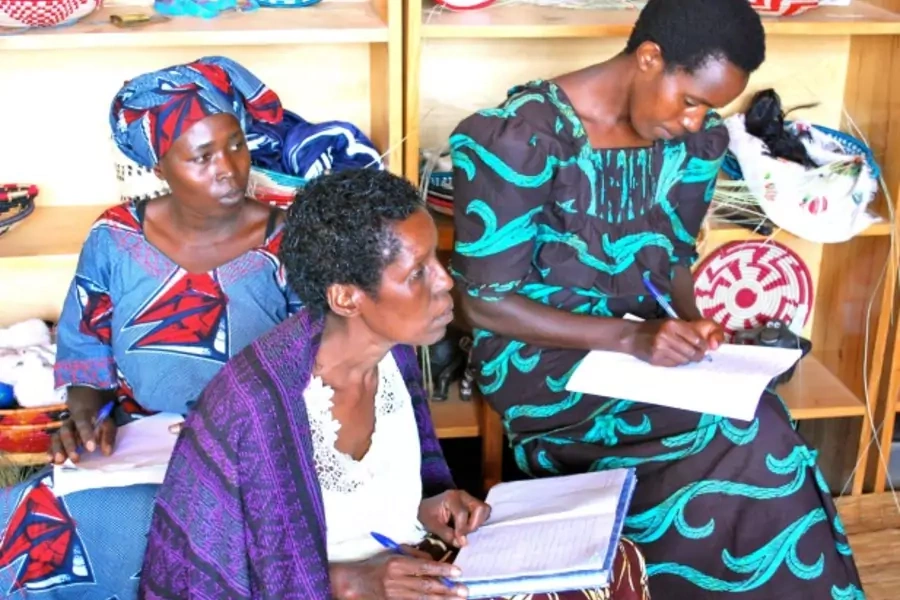Empowering Female Entrepreneurs in Rwanda

More on:
Emerging Voices features contributions from scholars and practitioners highlighting new research, thinking, and approaches to development challenges. This article is from Benjamin D. Stone, director of strategy and general counsel at MicroCredit Enterprises, CFR term member, and vice chairman of Indego Africa; and Karen Yelick, CEO of Indego Africa. Here they discuss how Indego Africa’s Leadership Academy for female artisan entrepreneurs in Rwanda aligns with the country’s twenty-year history of empowering women leaders.
On April 7, 2014, the world commemorated the 20th anniversary of the Rwandan Genocide, when more than 800,000 people were killed over three months of unimaginable violence. After the atrocities ended, women made up 70 percent of the country’s population. The Rwandan government wisely adopted ambitious policies and programs that invested in the power of these women to rebuild the shattered country. In the words of Rwandan President Paul Kagame: “Empowering women and ensuring gender equality ultimately enriches communities and entire nations.”
In 2007, Rwanda turned to the handicraft industry as part of its strategy to tap into the economic potential of women entrepreneurs. Yet, despite their impressive artisan skills, Rwandan women struggled to engage with global handicraft markets. Indego Africa, a nonprofit social enterprise and lifestyle brand, aimed to fill this gap. By generating market demand for products made by Rwandan women, building an international supply chain, and delivering formalized business training to female artisans, Indego strove to help women lift themselves out of poverty and become the country’s next business leaders.
Seven years later, Indego partners with more than 600 female artisans in Rwanda who run for-profit businesses called “cooperatives” and sells their jewelry, accessories, and home décor on its online store and through dozens of brands and retailers. Indego’s artisan partners, 65 percent of whom are their household’s primary earner, have re-invested their increased income in food for their families, school fees for their children, improvements to their houses, livestock, and new business ventures. At the same time, they have embraced Indego’s training programs in business, literacy, technology, health, and human rights, taught at each cooperative by Rwanda’s top university students. As a result, these female artisans are now increasingly competing in the global markets as independent, empowered businesswomen. As long-time artisan partner Emelienne Nyiramana explained, they are “dreaming dreams that before they never could have dreamed.”
Many of Indego’s artisan partners, like Nyiramana, have emerged as inspiring leaders. They help their cooperatives engage with major retailers visiting Rwanda, such as Nicole Miller and Anthropologie. They hold prominent leadership roles in their communities. They teach and mentor other women across Rwanda. And a few have even traveled to the United States to meet designers, buyers, and investors. But as these leaders surfaced, Indego realized that it could no longer effectively or efficiently deliver the same level of business training to all of the women. In 2013, focus groups of artisan partners confirmed this view and suggested that Indego concentrate more on the dynamic leaders poised to take the cooperatives to even higher levels of success, while delivering basic, less time-intensive training to other women who just want to go to work and earn a steady income. The artisans also recommended that Indego’s training programs include more real-life examples and exercises. Based on these insights, Indego is evolving.
This summer, Indego will launch a Leadership Academy to provide advanced business training to its most ambitious and entrepreneurial artisan partners. Every six months, Indego’s partner cooperatives will collectively select 25 participants for tailored, twice-weekly leadership sessions at Indego’s Kigali office. Classes will cover subjects ranging from customer care to technology to financial literacy to marketing. Each lesson will include assignments that are directly applicable to the women’s businesses, including writing emails to clients, sourcing raw materials, managing their cooperatives, and researching design trends.
The Leadership Academy will also encourage women teaching other women by hiring Teaching Fellows from the pool of nineteen Indego artisan partners who graduated from the Goldman Sachs’ 10,000 Women initiative. Indego will also organize networking events, field trips, and seminars led by successful local and international female entrepreneurs and educators. In the end, Leadership Academy graduates can use their training to not only help their cooperatives generate more income, but also to serve as mentors and inspirations for their co-workers, families, communities, and country. Perhaps one day some will even join Rwanda’s Parliament, where women hold an unprecedented 64 percent of seats, the highest proportion in the world.
More on:
 Online Store
Online Store